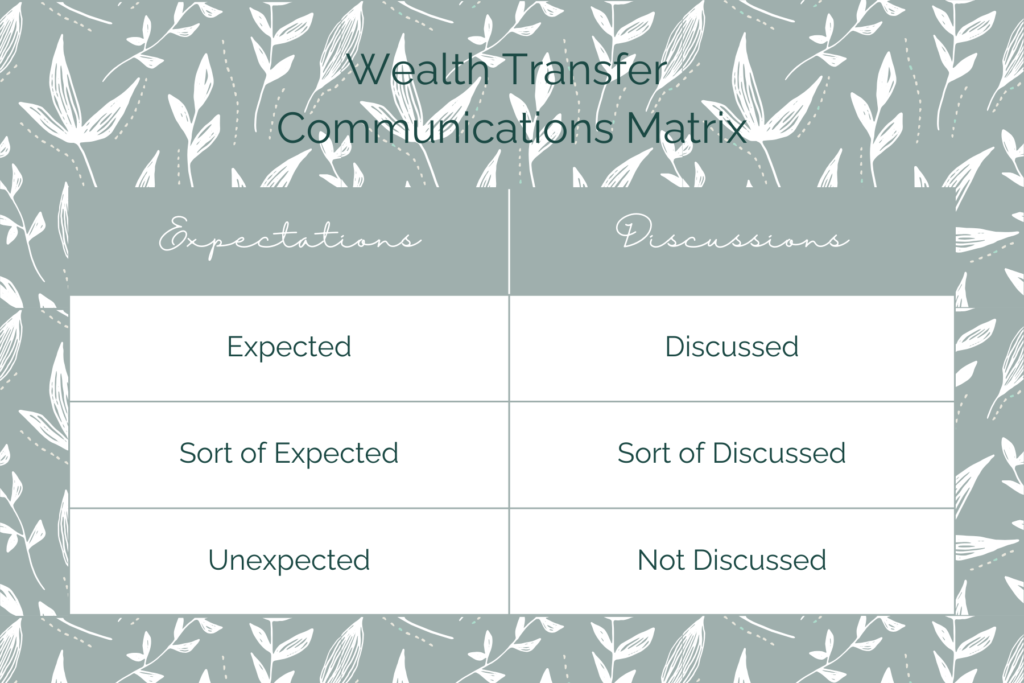Part Three: How Financial Therapy Helps with Wealth Transfer Dynamics
by Wendy Wright, LMFT, Financial Therapist, Wealth Transfer Dynamics Specialist, Money Coach
This post is part three of a four-part series focused on wealth transfer and financial therapy. The vignettes featured in each post are fiction. All names and events are the products of the author’s imagination and used in a fictitious manner. Any resemblance to actual persons, living or dead, or actual events is purely coincidental.
Check out part one for an in-depth look at The Great Wealth Transfer and part two for a focus on common pain points and strategies for success.
Devon logged into their discovery call with Wendy Wright, a financial therapist, feeling both hope and trepidation. They were excited to hear that something like financial therapy existed, but they had no idea what it was or if it could help. They recently sold a business and received their payout last week. Seven million dollars! And they’ll receive a similar payout annually in the coming years.
Devon has never had this much money. Historically, they struggled with credit card debt and lived a paycheck-to-paycheck life. They experienced the cycle of debt, paying it off in large chunks, promising to never go into debt again, and then finding themselves in the same situation.
They also hated their relationship with money — which sparked their business idea. They built an app to help people barter for goods and services to avoid money. The app took off, and soon, Devon faced several buyout offers. They accepted this particular offer not because it was the highest but because the buyer seemed most aligned with their vision.
So today, when the first installment hit their bank, Devon was stunned. They are glad to have a chance to talk through their feelings with a financial therapist.
In my years of experience working with clients in financial therapy sessions, I know solidly where to start.
In helping define my Signature Financial Therapy Approach, I created 10 Principles of Financial Therapy ©, knowing that the first principle — Abundant Compassionate Curiosity and Zero Judgment — must come first.
We start here because it’s the best way to wipe the slate clean and allow for assumptions, old stories, and past hurts to be put aside. Money words, financial tactics, expert opinions, our parents’ words and actions…all of these influences live in your brain with certain meanings and intensities. They block your ability to move into your own money story — what I call “owning your money.”
A transfer of wealth often includes messaging from the giver, or from your “family of origin” (that’s therapist-speak for your mom, dad, siblings, grandma, grandpa, or other significant family members). These messages are often more subconscious than overtly conscious.
Consider this example. Growing up, my family always used a grocery bag — the old school paper kind — for kitchen trash, kept under the sink. So that is what I did. Was this right or wrong? Nope, it’s morally neutral. I can remember going to a friend’s house where they had a stand alone larger trash can with plastic bags in it. Was this right or wrong? Nope, again, morally neutral.
This is a silly example, but I hope to show that we grow up with ideas of how things are supposed to be because of our limited sample size. When we want to shift our relationship to money, it’s important to start by realizing that your money beliefs may or may not be true. This is why we look back and identify our money past — not to hang blame somewhere but to gain context and understanding. Then, we can start to build our own money path.
Now, let’s apply this idea to a wealth transfer.
It’s important to give yourself grace as you enter into the adjustment period and shift your perspective on money. Charlene Laney, CFP, and Josh Dunlop, CFP, CDFA, wealth advisors and the founders of NewMaker Financial, explain it this way:
“When a financial reality dawns on us that we aren’t experienced in handling, there is an adjustment period. We see it all the time: Clients rack up a lot of unmanageable debt on that first credit card and overspend their first paychecks. Adjusting is just a normal part of life. The problem with an inheritance is that it can be largely spent before that adjustment has time to occur. Add in the tendency to emotionally spend as you process grief, and you have a recipe for a potential disaster. Being intentional with your inheritance is the best thing you can do.”
One of the biggest issues around a wealth transfer lies in the communication. Ramit Sethi speaks to this truth, saying, “It’s common for wealthy parents to leave an estate with no clear inheritance plan, and it’s always a disaster. Kids fight over the house and never talk again. Make a plan and discuss it with your kids while you’re alive. It’s not morbid; it’s planning.”
Ashley Agnew, the current president of the Financial Therapy Association, shares a similar sentiment: “Money can feel like the family member who no one talks about but is controlling everything.”
To help create clarity in communication, I created this matrix of the common kinds of communication that we find about wealth transfers.

You may have experienced several kinds of bridges across this matrix. For Devon, the wealth was just recently “expected” (so previously “unexpected”), alongside an absence of discussion. For Sarina (in part one of this series), the wealth transfer was “unexpected” and “not discussed,” so the level of shock is real! And for Maria (in part two of this series), wealth in her family was “sort of expected” and “sort of discussed.” I call this “sort of” because the communication around resources was not clear or designed to build confidence. Instead, it was meant to discourage, put down, and shame the receiver.
I also love the way that Megan deBoer, founder of Tended Wealth, explains the impact of unexpected wealth:
“Often, a recipient of unexpected wealth feels as though they haven’t earned it and therefore take longer to feel worthy of having it. This response, if unacknowledged, can lead to an unconscious rejection of it. This is typically expressed across a spectrum: on one end, not taking ownership of the wealth and only using small amounts in ways that Grandma would approve, and on the other end, liquidating the wealth rapidly to alleviate the uncomfortable feeling of being undeserving of it.”
Every combination on the communication matrix can trigger stress, anxiety, and confusion.
These emotions often lead to behaviors like avoidance, grasping for guidance from the Internet, or pushing money away by spending, giving, or gambling. When we pause and name the existing communication pattern, we can then identify the desired communication pattern. This practice often involves words like clear, wise, and communication-enhancing. In financial therapy, we start with changing your communication to yourself. This step is so key in building a mindful and meditative relationship with your money!
You may be thinking, “But if so and so would just ______, then this wouldn’t be so hard.” And yes, you may be right. With that thought in mind, we also work on processing your grief around the communication that you didn’t get. This act is part of the healing process that I like to call “money work.”
Once you have allowed space to grieve what did or didn’t happen, we can move forward to your vision, your relationship to money, and your desired communication patterns. If you stay stuck in the belief that someone “should have” talked to you, prepared you, or cared about you, you may struggle to energetically access the wealth, own the resources, and make your own decisions about the money.
Another key principle of my 10 Principles of Financial Therapy© comes into play here: Take the Money Word Out of the Sentence and Deepen What You Are Trying to Say.
This strategy helps you begin to write the story that you want your money to tell. Let’s look at a few examples:
- “I don’t want this money” can mean “I don’t want this connection to my dad. He hurt me!” or “I don’t want this responsibility. It terrifies me!” or “I don’t deserve it.”
- “If I give this money to my kids, they will be entitled brats!” can mean “If I give this easy access to resources to my kids, they will be selfish and have no values” or “If I give them this big bucket of more than enough, they won’t learn how to save their resources.”
- “If my partner gets this inheritance, it will ruin them” can mean “If my partner has more than enough money, they won’t need me.”
You get the idea. For this principle, we want to identify the underlying fears, desires, and beliefs driving your reaction. Taking out the money word is a great tool to help open up your mind to the deeper truth.
To close, let’s keep these three ideas in mind as we revisit Devon’s story.
- Communication is key to enhancing your money life.
- You don’t have to do it alone! A financial therapist is a safe and supportive person to add to your Financial A-Team.
- Uncover subconscious beliefs so that you can find your own money path and story.
The call went well! Devon was, at first, a bit teary just naming the events that took place and the dollar amounts. They felt seen and heard by someone who understands the psychology of money. They mentioned to Wendy that the first thing they wanted to do was pay off their credit cards and other debts.
Wendy didn’t offer judgment, rules, or a strict approach. Instead, she supported the idea of Devon taking a few days to Breathe, allowing their new bank balance and money landscape to sink in. Wendy encouraged them to put the money in a safe place and then gave Devon some specific journal exercises to do to help them absorb the change. Although they were shocked at this first step, they felt relief that they didn’t have to rush forward.
In part four of this series (the final blog post), I will show you how applying these principles works in real time for Sarina, Maria, and Devon. In the meantime, click here for more supportive resources and additional help. If you’re ready for individualized support, book a free discovery call now!

 [testimonials_slider no_cache=true random=true paging=true]
[testimonials_slider no_cache=true random=true paging=true] 



